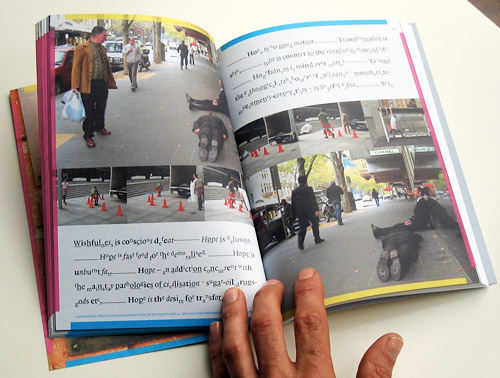I don’t think Tag is ‘against the city’; at least it is not a negation in total. It is difficult for play to be against something when it is caught up in the surprise and the joy of the new.
We have made similar work in the country, and of course the environment alters the work we make wherever it is. A rule of our practice, set out by John Cage, is ‘a work of art should include its environment’.
So, I see this new work not so much a critique, nor a logical attack, rather states of permanent play (permaplay) in everyday space and poesis (meaning-making) through activity before langauge. Making art without producing anything consumable is an obvious eco-politic that is 'against' the city (civis, civilisation, centre, transportation of resources, capitalisation, etc), but the work overall, I think, is more than this.
We specifically chose non-heroic, non-spectacular outer parts of Melbourne for no other reason than CBDs (toxicities) are so last century.
In relation to tagging itself I have a developing interest in the urban phenomenon of self-determining font making, graffitists who through the act of generating their own personalised fonts decentralise and demiltarise the alphabet in public space. This is important and exciting territory, and the body as tag is an extension of this line of graffic thought.
To make Tag we caught a train down to Melbourne, thus burning carbon, so this is a negation of our own making. A zero carbon footprint comes in small gradual steps over the next 6-7 years. Just in terms of carbon, we have a very small distance to go compared with, say, Fox Studios.
Additionally this film is part of a gift-ecology, a concept I'm developing so as my overall practice continues to contribute to the global movement of decapitalised art. I use gift-ecology instead of 'gift-economy' (a term developed by capitalists), because art should produce no waste – hence permanent culture (permaculture) as antidote to toxiculture.
Again, all this is transitional thought, on the way to a post-industrial, post-consumerist modality.
Thanks to all the commenteers – such generosity!

1 comment:
Response to PJ. You talk about in your 'how to do words with things' about city based artists feeding off their own disconnection/abstraction in order to do their art (i would have to check up on that); their angst becomes generative of the work itself, and because everyone in the city has this disconnection there is a good market for this kind of work. Consumers buy the art in order to express their solidarity with disconnection and consumption. Your play in the city( along with an interest in graffiti, tagging, fonting!), to me, expresses a critique of those kind of artistic practices. That is, an art practice not built around consumption, one that is decapitalised. You propose an exchange, or gift-ecology. (The idea of a gift-economy began with Marcel Mauss, an anthropologists writing in the late 1920s after the destruction of Europe – through war and the industrial revolution – and wanting to rediscover a point of human connection without economic and industrial subterfuge. His book, The Gift, is a rather interesting critique of capitalism). i digress, back to my long winded point. So you are interested in an art practice that generates responsibilities, obligations, debts, counter-gifts that keep a cycle of exchange going, that connects and keeps us in play with each other. (another side point, the word for gift in German 'Gib' is the same word as poison - i.e. the gift is not 'free' but indebts us to give back, which is not necessarily a bad thing. The gift; antidote and poison! Also the English derivative of gift comes from the same word as 'take': the gift economy is one where we give and take; by giving we take something from the other - we take their sense of debt so that they give back!).
Perhaps all i want to say is that a truly decapitalised practice would have nothing to do with the city; would have no play with its structures, because this is what gives and takes our (creative) energy. I love a good ideas stoush; this shows my terrible reliance on critique (this is what the university teaches). I retreat from creativity through the self-defense of critique - now there is another provocation... PJ, i might add, i find your work terribly hopeful and evocative of a post-industrial future. Please keep sharing and indebting us all in a gift-ecology.
Post a Comment